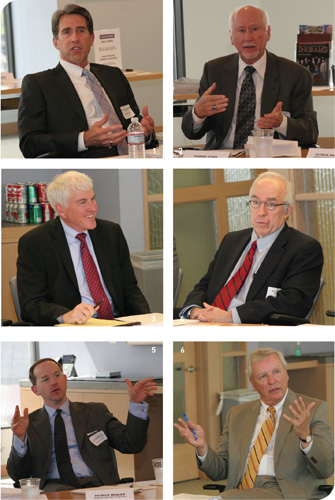
1. Health care, energy and the IT sectors seem to be faring well, said Trip Frizell. | 2. The downturn, said Tom Stahl, reinforced the need for better client service. | 3. After a lighter moment, Mark Hinderks addressed the need for law firm efficiency. | 4. Bob Keim said work redirected to practice groups hobbled by the economy was keeping lawyers busy. | 5. An unexpected benefit from the downturn, said Patrick Whalen, was the sharp rise in the levels of available talent. | 6. Bob Fisher noted that growth in other practice areas had offset reductions in M&A activity.
“It’s been slower than people had predicted,” said Larry Frazen. “I don’t think the banks have come in with both feet yet at all.” Frazen believes that the credit proposition has changed in part because of regulator demands on banks and the kind of loans they are able to make. “It’s slow to loosen up,” said Frazen, “but it is loosening up a little bit.”
As Trip Frizell noted, much depends on the industries involved. The traditional manufacturing industries have been slow, but the health care, energy and information technology sectors have been securing money “and have been able to find the deals.”
As a real-estate attorney, Snyder saw opportunities on the distress side for people with capital, buying distressed pools and working them out. “It’s been an interesting market,” said Snyder.
Joe Hemberger, a partner with McAnany Van Cleave & Phillips, had a similar perspective. “Our business practice had to shift a little bit,” he noted. “We were fortunate to slide into a lot of bank work and a lot of workouts, repossessions and foreclosures, and now that’s turning into loans.”
“There will always be plenty of bad stuff,” Pete Smith said in answer to Snyder’s question on what he had seen through his bankruptcy practice. As he noted, the need for bankruptcy attorneys never goes away, even if law firms are reluctant to call bankruptcy “bankruptcy.”
What Law Firms Do
Pete Smith wondered whether corporate law firms were unnecessarily limiting their practices. Smith, for instance, does family law when appropriate. “All your clients, they all have problems,” said Smith, “human problems.” He asked his colleagues if, during the downturn, they thought to expand their practices to deal with the range of problems clients face.
“You raise a good point,” said John Granda. “One of the reasons we’re able to keep our corporate lawyers busy is that we were not just doing transactions.” Stinson’s attorneys have also been doing securities compliance for public companies, corporate governance, and SEC enforcement.
“The name of the game is to keep your people busy and to do interesting, challenging, well-paying work,” said Granda. “It’s good to be specialized, but not too specialized.”
“I think Pete’s question is one we all need to grapple with,” said Patrick Whalen. He, like Smith, was particularly concerned that other providers, accountants in particular, were moving into traditional roles long served by lawyers. “It’s pretty staggering what the trends indicate will be in the future,” said Whalen. “More and more activity is being peeled off.”